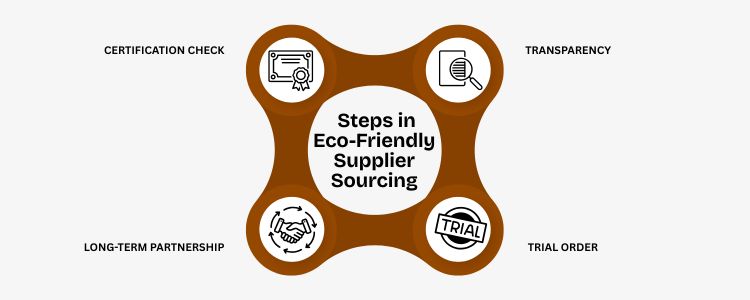How to Source Eco-Friendly Products for Your Retail Business
Sustainability has become more than just a niche concern; it’s now a mainstream business imperative. Retailers, large and small, are evaluated not only by the products they sell but by how responsibly they source them. Increasingly, many entrepreneurs are finding that rather than having the option to adopt eco-friendly product sourcing retail business practices, they must in order to remain relevant and resilient. Although this transition is exciting, the transition must be deliberate in supplier choice, product assessment, and long-term planning.
The Growing Importance of Sustainable Sourcing
Consumers today expect more than just value and good looks. They want to know their purchases aren’t harming the planet. Retailers are thus under pressure on two fronts: on the one hand, they need to meet consumer demand; on the other hand, they must comply with increasing environmental regulations.
Eco-friendly sourcing has retailers:
- Improving brand loyalty and reputation
- Decreasing regulatory risk.
- Opening doors to premium markets that prefer to pay for sustainability.
This demand for sustainable products is the reason we see brands shifting toward sustainably-sourced materials across markets, including apparel, cosmetics, food, and furniture.
Eco-Friendly Supplier Sourcing for Retailers
Finding the right supplier is the foundation of sustainability. When sustainably sourcing suppliers for retailers, businesses need to consider the following:
- Certifications: Check for suppliers who are certified with internationally recognized eco-labels such as Fair Trade, FSC, or OEKO-TEX.
- Material sourcing: Only use supplies that have renewable, recycled, or sustainably sourced raw materials.
- Production methods: Suppliers who use sustainable processes, renewable energy, and ethical labor practices must be prioritized.
- Transparency: Authentic, sustainable suppliers disclose the origin of materials, carbon footprint, and any applicable audit reports.
By establishing long-term relationships with these suppliers, businesses are decreasing uncertainty while also providing consistent, high-quality products.

Wholesale Eco-Friendly Products Retail: Scaling Responsibly
Sourcing on scale can be difficult for small to mid-sized retailers. By collaborating with wholesale eco-friendly products retail associations, there are two benefits:
- Cost savings: Resale cost is lower due to a lower unit cost that comes from buying in bulk.
- Assortment: Wholesale suppliers have eco-friendly alternatives in many categories, from packaging to finished goods.
This model allows retailers to add sustainability to their operations without sacrificing profit margins.
Best Sustainable Product Sourcing Strategies
Planning responsibly involves purchasing goods involves many ways. The best sourcing of sustainable products includes:
- Source diversity: Avoid becoming exceedingly reliant on one vendor/supplier, or a country for a product. This minimizes risk and increases resilience.
- Life-cycle assessment: Assess a product from raw material extraction to disposal of that same product to limit negative impacts on the environment.
- Sourcing locally when possible: Short supply chains that reduce transportation-based emissions.
- Collaborative partnerships with vendors: Working with suppliers cooperatively can help create and adopt new designs and processes that are more sustainable.
Retailers that combine sustainability and efficiency add value to consumers, as well as to their profits.
Sustainable Packaging Sourcing for Retail
No retail sustainability strategy is complete without the packaging issue. Sustainable packaging procurement for retail means switching out plastics for biodegradable, compostable, or recyclable materials. Some options include:
- Paper packaging made from FSC-certified paper, including paper bags and boxes.
- Bioplastics, which are made from corn starch or sugarcane, and intended for (or bona fide) food packaging.
- Reusable packages, such as cloth bags, refillable containers, or modular systems.
- Using minimal packaging, which cuts down on the extraneous use of materials through design.
Using sustainable packaging is an important way to reduce waste while simultaneously providing a tangible brand representation of sustainability.
Technology and Eco-Friendly Sourcing
Digital platforms are changing the way retailers access eco-supplier relationships and products. Online B2B marketplaces now include sections devoted to sustainable products. Retailers can search suppliers by certifications, minimum orders, and distance, making eco-sourcing easier than ever.
Blockchain and AI are enhancing transparency in the supply chain, validating authentic eco-labels, and providing assurance to sustainability claims.
Balancing Cost with Sustainability
A prominent myth related to eco-friendly sourcing is that it invariably increases costs. Yes, initial procurement costs may be higher, but the longer-term benefits can include:
- Lower waste management costs.
- Increased brand loyalty and increased sales.
- Access to sustainability-oriented investors and grants.
Retailers should consider eco-friendly product sourcing through a different lens; therefore, we suggest retailers consider eco-friendly sourcing as an investment, not a cost.
Case Studies: Retailers Leading the Way
- An Indian organic food retailer transitioned to compostable packaging and attracted eco-conscious urban consumers.
- A European boutique apparel brand partnered with Indian textile suppliers certified for organic cotton, enhancing its premium positioning.
- A home décor chain in North America reduced plastic imports by adopting bamboo and recycled glass products from Southeast Asia.
These examples show that with foresight and planning, eco-friendly sourcing can deliver both impact and profitability.
Conclusion: Building a Responsible Retail Future
Sustainability is shaping the future of commerce. For retailers, becoming eco-friendly through product sourcing and retail business practices is more than regulatory compliance; it is preparing for long-term planning. Retailers can incorporate responsibly sourced suppliers, sustainable packaging, and technological transparency into their product sourcing and retail business practices, developing resilient, ethical, and customer-focused supply chains.
In a world where consumers expect authenticity before they trust a brand, eco-friendly product sourcing is not a fad it is a long-term strategic operational advantage.
Frequently Asked Questions (FAQ)
Electronics, pharmaceuticals, renewable energy, and textiles will all be drivers.
India provides cost-effectiveness, skilled labor, and positive policy choices, making India a secure addition to global supply chains.
Textiles, pharmaceuticals, agro-processed products, and electronics.
Very competitive due to regulatory compliance, quality, and cost parity with similar products, and benefits from a tariff-free trade agreement.
Suppliers provide flexibility, scale, and reliability to global buyers and thus mitigate the supply chain disruption inherent in supply chain risks.
Great people, great policy, together with a variety of industry clusters.









